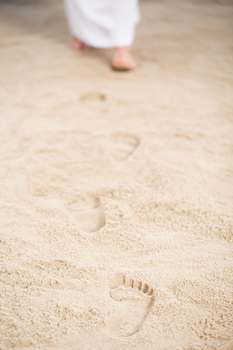
As we approach the celebration of the sacred Triduum and the feast of Easter, we are at a different place on the journey. Phrases like “unchartered waters” and “foreign soil” come to mind as the deadly coronavirus has attacked the United States. Death has become real as the number of victims accelerates, and unknowns about treatment and the lack of vital equipment have become part of the daily news cycle.
The times in which we live make the desert experience of Jesus more real than ever. During these final days of Lent, we can relate to the anxiety of the apostles as the clouds of dissent began to gather around Jesus.
Jesus overturning the tables of the moneychangers in the temple doesn’t seem so remote when we consider the sexual abuse crisis that has afflicted the Church, or the plunging stock market. Jesus’ agony in the garden has become a personal agony for those who are struggling for their next breath or to put food on the table for their family.
At this writing, the doors to the Eucharist have been shuttered. How long this unprecedented measure will last is uncertain. No one knows the answer, just as we never imagined the Body and Blood of Jesus would not be there for us to receive.
A spiritual fast has been imposed, making the words of Jesus, “Man does not live by bread alone” especially poignant. And while the option for spiritual communion is always present, the Word of God, as manna for the soul, continues to sustain us when we take and read, pray and reflect.
Through the virtual transmission of Mass via television and internet, we remain united. We can visit the Blessed Sacrament, read the Passion narratives and set up a place to venerate the cross in our home, silently remembering the price that was paid for our salvation.
As we remember how the Word of God became flesh and loved us to his death, the story of Jesus’ Passion and death never gets old, but seeps more deeply into our soul each time we experience it through prayerful reflection.
In my office is an icon of Jesus portrayed as the suffering servant, rising from a tomb that represents a baptismal font. His wrists, though crossed, are unbound because he was bound by the cord of love, and his skin is charcoal grey. Only after years of meditating with the icon did the words, “He himself bore our sins in his body on the tree, that we might die to sin and live to righteousness. By his wounds you have been healed” (1 Pt 2:24) did I understand. Sin is dark and ugly, and the dark color of Jesus’ skin represents what St. Paul wrote, “For our sake he made him to be sin who knew no sin, so that in him we might become the righteousness of God” (2 Cor 5:21).
In his book, “Poverty of Spirit,” Johannes Baptist Mets explained that when Jesus became man, he didn’t simply don human nature as if he were putting on a costume that he could discard when it became inconvenient. He was truly like us in everything but sin, and yet he took on our sins.
Now when I look at the icon, I am reminded that if we are to follow in the footsteps of Jesus, we must shed our self of all that is dark and ugly in us so that Jesus did not die in vain.
As we approach the Triduum, another image of Jesus comes to mind. In the Garden of Gethsemane, he is praying, kneeling next to a large rock the size of a boulder, which serves as a pre-dieu during his agony in the garden.
I never gave it much thought until I visited the site in the Holy Land. Amid olive trees whose roots date back to Jesus’ time, I looked for the rock, but to no avail. It was nowhere to be found.
Recently, the absence of the rock has taken on new meaning. The image of Jesus praying at the rock as the angel offers him a cup to assuage his anguish has become for me a foreshadowing of the rock that was rolled in front of his tomb on Good Friday only to be rolled away during his Resurrection.
During these times of uncertainty and travail, let us remember that death was only the beginning, not the end of the story. Rocks that seem as big as boulders in this life will one day be rolled away if we remain faithful, for we, too, will rise with Christ.
